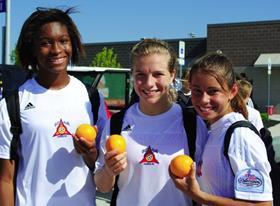
Citrus from so-called citrus black spot (CBS) areas of South Africa will be admitted to the US from September, it has been revealed, although the decision is not expected to affect exports this year.
South Africa's Citrus Growers’ Association (CGA) says it has been told by the South African Department of Agriculture, Forestry and Fisheries (DAFF) that a document published on Monday (Federal register Volume 83, Number 112) indicated that a new rule which allows wider South African access was on the agenda, indicating which regulations are in the final stage of approval.
A few days earlier, DAFF had sent out a notice that the final rule allowing for the importation of several varieties of fresh citrus fruit, as well as citrus hybrids, into the continental US from areas in South Africa where citrus black spot (CBS) had been known to occur, was published and that exports of citrus from these CBS areas would start in 2019.
On Friday (15 June) DAFF corrected the statement and indicated that the final rule is expected to become effective in September 2018.
Previously, only citrus grown in the Western and Northern Cape, regarded as CBS free areas, was admitted into the US.
Western and Northern Cape growers have over the years developed a strong market in the US under the Summer Citrus umbrella and benefit from the US Growth and Opportunities Act (AGOA), which was renewed two years ago to support African agricultural exports into the US.
The CGA says publication of the final rule will be widely appreciated by those in the industry who have been waiting for this to happen.
“All industry players understand the importance of taking advantage of this new opportunity in a responsible manner,” says Justin Chadwick of the CGA. “There are recent examples where access can be short lived if attention is not given to all access conditions and market requirements.
'The industry will build on the example shown by growers in the Western and Northern Cape, who have nurtured this market, built strong relationships through disciplined marketing, and paid attention to ensuring quality, phytosanitary, sanitary and market needs are met,' he adds.
In order to ensure compliance with import regulations, the growers in the Western and Northern Cape conducted a joint shipping programme utilising reefer vessels which delivered fruit directly to Philadelphia for final clearance before marketing.
Vessels are scheduled in such a way that the shipping programme ensure regular supply and growers have been careful not to interfere with the end or start of the Californian marketing programmes.
It is likely that the South African industry will now have to engage in a serious reorganisation as far as the US market is concerned. This will have to be done before the 2019 season and will have to give answers to the questions of what will happen to the Summer Citrus campaign and the very disciplined market supply programme built up over the years.
One benefit for the South African industry would be that South African lemons would now get access to the US. For the major lemon region, the Sunday’s River Valley, and other areas where lemon production in rapidly increasing, this would be a major boost.



